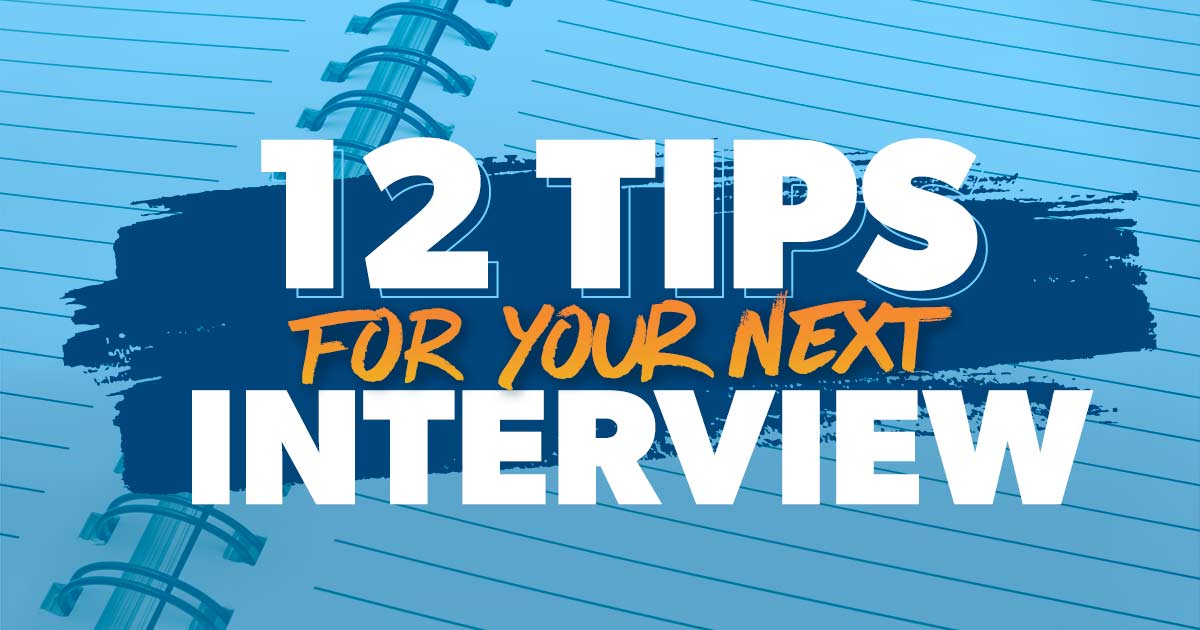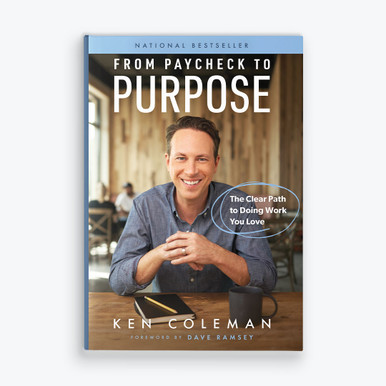12 Interview Tips to Impress Any Hiring Manager
7 Min Read | Jun 27, 2024

If you’ve gotten a job interview in today’s crazy job market, then you should be proud of yourself! That alone is a big deal because it means your resumé really stood out to the hiring manager. Now it’s time to ace the next step: the interview.
Ready to get started? Bring your A game by following these 12 job interview tips:
1. Research the company and your interviewers.
Make it your goal to be as informed about your potential employer as possible. Preparing for your interview by doing your research beforehand shows that you take initiative and that you care. Here are a few things to research:
- The company’s history
- Their mission, vision and values
- Their leadership team
- Their products or services
- Everything you can find about the role you’re applying for
Also, see what you can find out about your interviewer! Keep it cool—don’t stalk them obsessively—but look for their bio information on the company’s website or connect with them on LinkedIn.
Take notes on what you learn and bring them to your interview. Use that information to spark conversation and connection.
2. Dress for the company.
As you decide what to wear to the interview, take the time to find out what the dress code is at the organization you’re applying to. The goal is to not be underdressed or overdressed and to fit in with the culture. You don’t want to show up in a three-piece suit if everyone at the office wears shorts and T-shirts every day! When in doubt, smart casual is the way to go.
And regardless of what type of clothes you end up wearing, make sure they’re clean, ironed and fit well.
3. Show up early to your interview.
Rushing into your interview stressed, late and maybe a little sweaty isn’t a great first impression to make. “My alarm didn’t go off” and “Traffic was crazy” are not explanations—they’re excuses.
The last thing you want to do is start your job interview with a lame excuse. Instead, double the amount of estimated traffic you might encounter and set multiple alarms so you don’t accidentally hit snooze and fall back asleep.
4. Clarify your personal mission statement.
You need to be prepared to explain why you want to be a part of this team and how you’ll contribute. Think about it: If this job doesn’t align with your skills and what you’re passionate about, then why are you even applying?
Writing your own personal mission statement will help you put your purpose into words—for your own benefit as well as for the recruiter. Then, when the recruiter asks why you’re a good fit for the position, you’ll be able to answer with confidence!
5. Be fully present.
It’s crazy that we even need to talk about this, but unfortunately, being glued to our phones is a cultural blind spot for many people.
Keep your phone in your purse or briefcase—or heck, you can even leave it in the car! Unless there’s a specific reason or request from your interviewer for you to use it, you should never, ever be on your phone during an interview.
When you pull out your phone even to check a quick text message, you’re actually sending your own message—that you’re distracted and valuing something else above the interviewer’s time. And by the way, this applies to smart watches too.
6. Bring a copy of your resumé or portfolio.
If the interviewer forgot to print your resumé or doesn’t remember the type of work in your portfolio, having an extra copy on hand will show them that you’re always prepared.
Besides, if you’ve created the perfect resumé and cover letter, of course you want to show them off as much as possible!
7. Don’t lie or overshare.
Whether they ask about your salary, job responsibilities or experience, always tell the truth. Getting caught lying is an instant deal breaker. Why risk it?
You deserve to win at work. Our new book and assessment will show you how.
Along with not lying, don’t overshare.
Let’s say your interviewer asks you about your last place of employment. Our tendency is to give them every single detail. Instead of giving them a brief answer about your responsibilities at your last job, you tell them about the difficult people on your team and the long hours you were expected to work. When you do that, you create questions that don’t need to be created.
Instead, answer the question specifically and let the interviewer ask follow-up questions if they’re needed.
8. Be yourself.
Bad acting happens all the time in interviews. Don’t try to be an actor. Be authentic. Your nerves are already off the charts, so this is not the time to try something outside your default mode.
If you try to be funny when you’re not really that funny, it’s going to be awkward and uncomfortable. So, in this case, stay in your lane. If you end up getting the job, they’ll figure you out pretty quickly, so just be yourself from the get-go.
9. Check your nonverbal cues.
Your body language sends powerful messages. It can portray confidence and display interest and engagement, but it can also be a tip-off that you’re nervous or underprepared. Here are the most important cues to be mindful of during your job interview:
Make eye contact.
Looking someone in the eye makes you seem confident—regardless of how you feel on the inside. Even if it feels uncomfortable, keep the eye contact consistent. I promise you, it’ll be far more uncomfortable for the interviewer if you stare at the ground while they’re speaking to you.
Smile.
Who doesn’t want to hire someone who is friendly and approachable? That’s how you come across when you smile a lot. Just make sure there’s nothing in your teeth before you walk in!
Act engaged.
Sit up, lean in, and nod your head. This posture and these nonverbal cues communicate that you’re engaged, interested, and listening closely to what the interviewer is saying. That’s the type of person most organizations could only wish to hire!
Take notes.
Bring a pen and notebook to your interview so you can write down important things the interviewer says. This will communicate that you’re teachable and interested in what they have to say.
10. Don’t ask about your salary right away.
When you ask about money, paid time off or holidays too soon, it’s a huge turnoff. That communicates to the interviewer that you’re more interested in the perks instead of the work itself. If the recruiter decides to bring it up, that’s great—but you shouldn’t force it on the first conversation. Ideally, you’ll talk about salary once the job offer has been made.
11. Ask questions.
Yes, you’ll need to be prepared to answer questions, but this interview goes both ways!
Here are a few examples of questions you can ask:
- What does it look like to be a successful team member here?
- What do you (the interviewer) love most about your job? What are your greatest challenges?
- Where is this organization headed? What are you looking forward to as a company?
- How would you describe the company culture?
Write your questions down on a professional-looking notepad and bring them with you.
12. Send a thank-you note.
After you’ve crushed your interview, send a quick note (email works great) thanking the people you spoke with for their time and effort. If you want the job, say so! Here’s one way you could word it:
Thank you for taking the time to talk about the ____ position. I’m grateful that I had the opportunity to meet you and learn about the organization. I would be honored to be a part of your team and bring my skills of ____ and my passion of ____ to further your mission.
Get Clear Before Your Interview
Landing your dream job is possible! I wrote my new book, From Paycheck to Purpose, so you can get the clear path to doing work you love.


